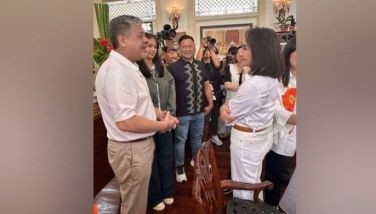What is the purpose of a Senate investigation?
In a government of laws, and not of men, like ours, the three branches, namely, legislative, executive, and judiciary, have distinct and separate scopes of powers and authority. The Legislature enacts the laws. The Executive implements the laws. And the Judiciary interprets the laws and resolves conflicts arising from their implementation. Investigations are essentially judicial in character. It belongs to the courts and the prosecutorial service and the police. Whenever the Senate or the House does any investigation, it is only in aid of legislation, not to establish guilt or innocence. It is merely to find the gaps in existing systems that might require a new law, or an amendment of the statutes. A legislative investigation is not an end by itself. It is supposed to be a means to a higher end of legislation.
However such kinds of inquiry, whether by the House or by the Senate, especially if they are seen by the whole country via national television, could be a potential weapon of mass destruction. It can be used to subject a person to interrogation, without any right of cross-examination. It can put the honor, reputation and dignity of one to a veil of suspicion and ridicule. Whenever a person is subpoenaed to appear as a resource person, he is duty-bound to appear and to testify under oath, under pain of direct contempt in case of refusal. A Senator has the unabridged right to raise his voice, sneer at or even dress down any person and alas, the latter is never allowed to rebut or voice an objection. It is an unfair situation.
In theory, the Chamber that investigates can subpoena any one. But, in the exercise of restraint and respect for a co-equal branch of government, it has never happened that Congress ever subpoenaed a sitting President. And if so, why then issue a subpoena to an incumbent vice president? Former President GMA issued a memo to all her Cabinet members disallowing them from attending any legislative investigation without her prior consent. This was based on the principle of separation of powers, and the theoretical equality among the three: executive, legislative, and judiciary. To subject the vice president to a legislative investigation, would, to our mind, undermine the independence of the executive.
Moreover, if a case has already been filed against the vice president before the Ombudsman or the Sandiganbayan, wouldn't t it be a better protocol to allow the pending case to continue, without a parallel congressional or Senate inquiry that might prejudice the pending case? Is the aid to legislation so urgent that it could not wait for the completion of the judicial processes. Would such contemporaneous congressional inquiry not be seen as constituting a case of forum-shopping, and splitting the cause of action, and multiplicity of suits, which, in the words of the High Tribunal, are obnoxious to the orderly administration of justice. What then is the compelling reason to undertake this process?
Finally, is there any assurance that when a person appears before a congressional inquiry, his human rights, dignity, and self-esteem be not undermined nor compromised? Could he invoke his right against self-incrimination? Could he use his right to remain silent? Could he insist to confront his accusers and cross-examine them? And if one or two investigating senators or congressman had already formed an opinion or has expressed a pre-judgment of the merits of the case, wouldn't it be the better part of delicadeza to inhibit and opt not to participate? Yes, there is no doubt that these kinds of investigations can lead to better legislation. But never, never should they be used in order to persecute and malign any man, without due-process of law.
- Latest



















